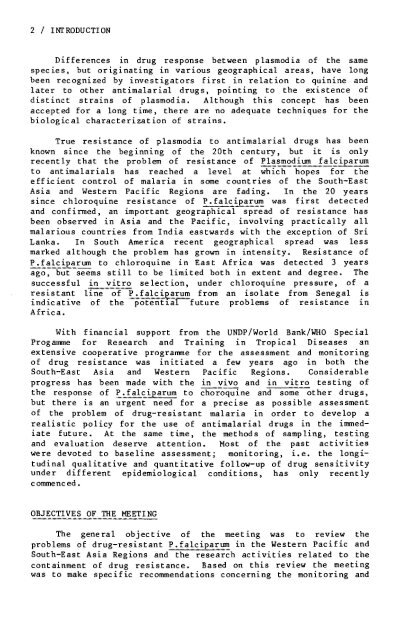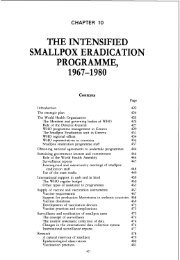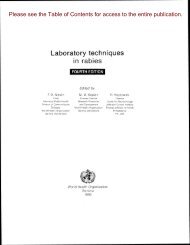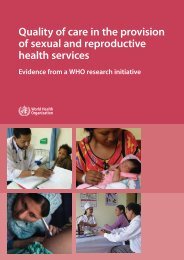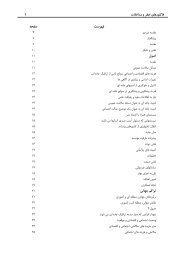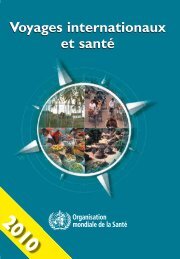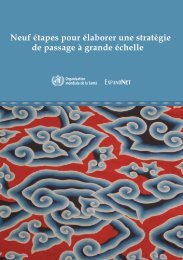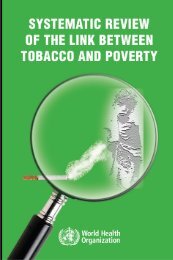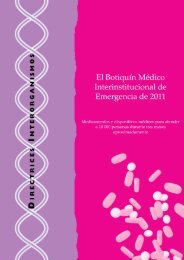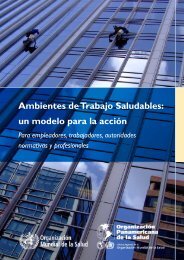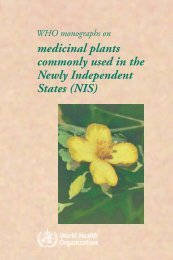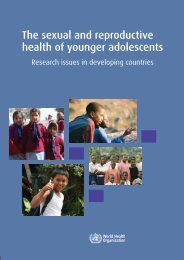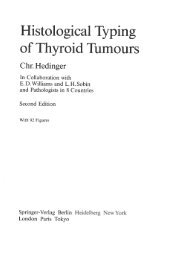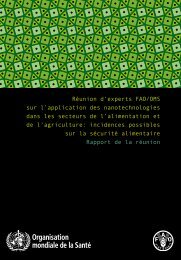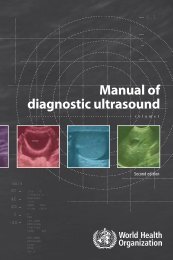Drug-Resistant Malaria - libdoc.who.int - World Health Organization
Drug-Resistant Malaria - libdoc.who.int - World Health Organization
Drug-Resistant Malaria - libdoc.who.int - World Health Organization
You also want an ePaper? Increase the reach of your titles
YUMPU automatically turns print PDFs into web optimized ePapers that Google loves.
2 / INTRODUCTION<br />
Differences in drug response between plasmodia of the same<br />
species, but originating in various geographical areas, have long<br />
been recognized by investigators first in relation to quinine and<br />
later to other antimalarial drugs, po<strong>int</strong>ing to the existence of<br />
distinct strains of plasmodia. Although this concept has been<br />
accepted for a long time, there are no adequate techniques for the<br />
biological characterization of strains.<br />
True resistance of plasmodia to antimalarial drugs has been<br />
known since the beginning of the 20th century, but it is only<br />
recent ly that the problem of resistance of Plasmodium falciparum<br />
to antimalarials has reached a level at whrcllhopes-f~the<br />
efficient control of malaria in some countries of the South-East<br />
Asia and Western Pac ific Regions are fading. In the 20 years<br />
since chloroquine resistance of P.falciparum was first detected<br />
and confirmed, an important geographical-spread of resistance has<br />
been observed in Asia and the Pacific, involving practically all<br />
malarious countries from India eastwards with the exception of Sri<br />
Lanka. In South America recent geographical spread was less<br />
marked although the problem has grown in <strong>int</strong>ensity. Resistance of<br />
P.falciparum to chloroquine in East Africa was detected 3 years<br />
ago~ibut-seems still to be limited both in extent and degree. The<br />
successful in vitro selection, under chloroquine pressure, of a<br />
resistant line ofP.falciparum from an isolate from Senegal 1S<br />
indicative of the 'potentlal--future problems of resistance in<br />
Africa.<br />
With financial support from the UNDP/<strong>World</strong> Bank/WHO Special<br />
Progamme for Research and Training in Tropical Diseases an<br />
extensive cooperative programme for the assessment and monitoring<br />
of drug resistance was in itiated a few years ago 1n both the<br />
South-East Asia and Western Pacific Regions. Considerable<br />
progress has been made with the in vivo and in vitro testing of<br />
the response of ~.falciparum to choroquine and some other drugs,<br />
but there is an urgent need for a precise as possible assessment<br />
of the problem of drug-resistant malaria in order to develop a<br />
realistic pol icy for the use of antimalarial drugs in the immediate<br />
future. At the same time, the methods of sampling, testing<br />
and evaluation deserve attention. Most of the past activit ies<br />
were devoted to baseline assessment; monitoring, 1. e. the longitudinal<br />
qualitative and quantitative follow-up of drug sensitivity<br />
under different epidemiological conditions, has only recently<br />
commenced.<br />
OBJECTIVES OF THE MEETING<br />
The general objective of the meeting was to review the<br />
problems of drug-resistant P.falciparum in the Western Pacific and<br />
South-East Asia Regions and the resear~h activities related to the<br />
containment of drug resistance. Based on this review the meeting<br />
was to make specific recommendations concerning the monitoring and


